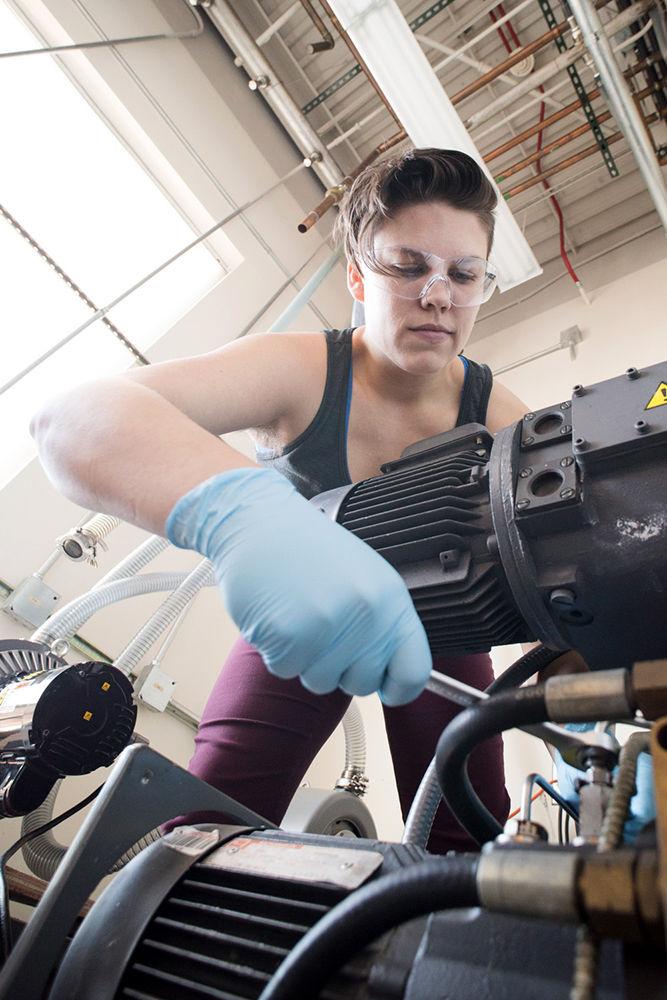Sara Jo Taylor always knew she was good at math and science. However, it wasn’t until her high school chemistry teacher encouraged her to be an engineer that she considered turning her scientific and mathematical skills into a career. Now, Taylor, a sixth-year Ph.D. student studying chemical engineering, acts not only as a scientist, but also as an inspirational leader for those who do not fit the stereotypical image of a scientist.
Feminist Scientists has been an active student organization here on campus since its first meeting in June 2015 and works to unite women along with people of all gender identifications and sexual orientations who work in male-dominated fields, specifically scientific ones.
Originally a graduate group, Taylor founded Feminist Scientists with three friends who were also female scientists. The organization has continued to grow each semester and now holds roughly 20 dedicated members. Taylor, a recognized feminist and a scientist, has personally experienced common issues for women working in male-dominated workplaces across career fields.
“My experience in even small group meetings, where I was the only woman, I found it difficult,” Taylor said. “It was just not a space to let your guard down and collaborate, so that was frustrating.”
As a group, Feminist Scientists focuses on reading and discussing science-related books and articles, as well as offering support and understanding to its members. According to Taylor, part of the reason the group came together was to vent about the underestimated struggles female scientists face on a daily basis, specifically fighting to be heard and respected within their career fields.
Taylor notes author Banu Subramaniam’s novel “Ghost Stories for Darwin: The Science of Variation and the Politics of Diversity” as a game-changer within the group, as it worked to resonate with each and every member.
“Each of us saw ourselves in different parts of it,” Taylor said. “It felt really important that we were reading and talking about what affected us.”
Last year, Subramaniam came to NC State and met the group personally — an impressive feat for the organization. While each feminist scientist’s experience is unique in its own right, Taylor said there remain some struggles that are all too common for those working in a typically male-dominated arena.
“I think that it can range from just the feeling of not seeing people that look like you around, and being constantly reminded that you’re not in the in-group, to not getting hired because you don’t fit the stereotypical [image of a] good engineer,” Taylor said. “Also, pretty explicit sexism can occur where the men in an organization don’t check each other. It can be really hard … you don’t have any allies, or maybe you do but those folks don’t want to step on other people’s toes. Because it’s such a normalized environment, to speak up about it as a woman or a man it rocks the boat in a way that can be easily dismissed.”
Saif Hassan, a fifth-year studying women’s and gender studies, first met Taylor in a chemical engineering lab and was inspired by the way she has worked to redefine what it means to be a scientist. Hassan has since been a part of Feminist Scientists in order to support and encourage those who are in marginalized groups within their career field.
“The big picture [of Feminist Scientists] is to confront the culture of STEM fields, and the way women and also people of sexual orientations, or people who present or act outside of the very strict way that scientists are supposed to, act,” Hassan said.
Hassan said that his goal for this year is to get more undergraduate students involved with the supportive group, specifically students who have felt ostracized by their choice of major given how they’ve been treated by those around them.
Since joining Feminist Scientists as an undergraduate student, Hassan is one of many who has benefited from the group’s influence. Mostly, it has shown Hassan that there’s room for all types of personalities and identities within STEM fields.
“Meeting people who are smart and not so rigid opens you up to the fact that you don’t need to be homogenous and the same kind of person [as others] to be successful in that kind of field,” Hassan said. “You can still be yourself, even if that includes weird character traits or things that aren’t considered normal.”
While Feminist Scientists has spread much support to its members here at NC State, Taylor isn’t done yet. One of Taylor’s current goals is to start a similar group at Durham Technical Community College where she teaches general chemistry, spreading the feminist scientist phenomenon throughout the Triangle area.
The next Feminist Scientists meeting is Thursday, Nov. 2 from 3-4 p.m. in D.H. Hill Library, room 1145. For more information, contact Sara Jo Taylor at sjtaylo2@ncsu.edu.













